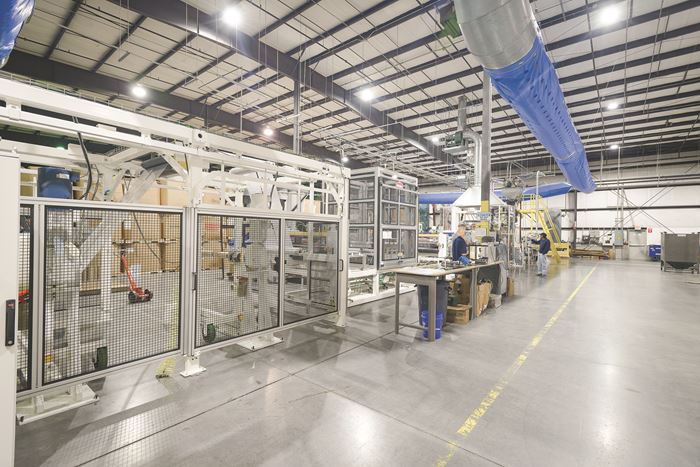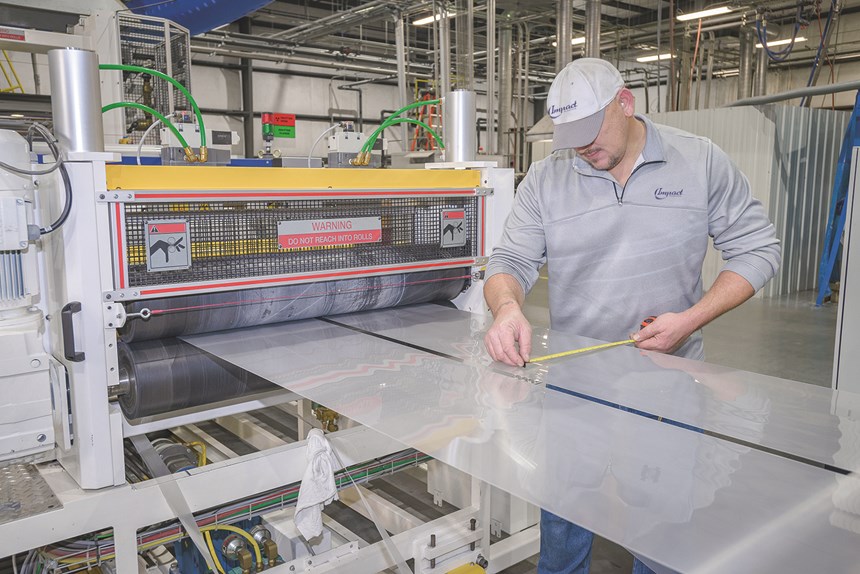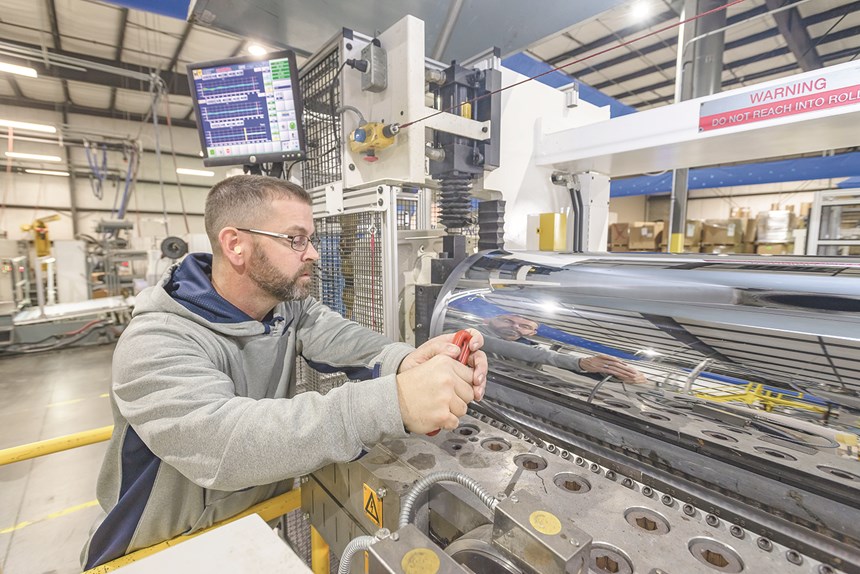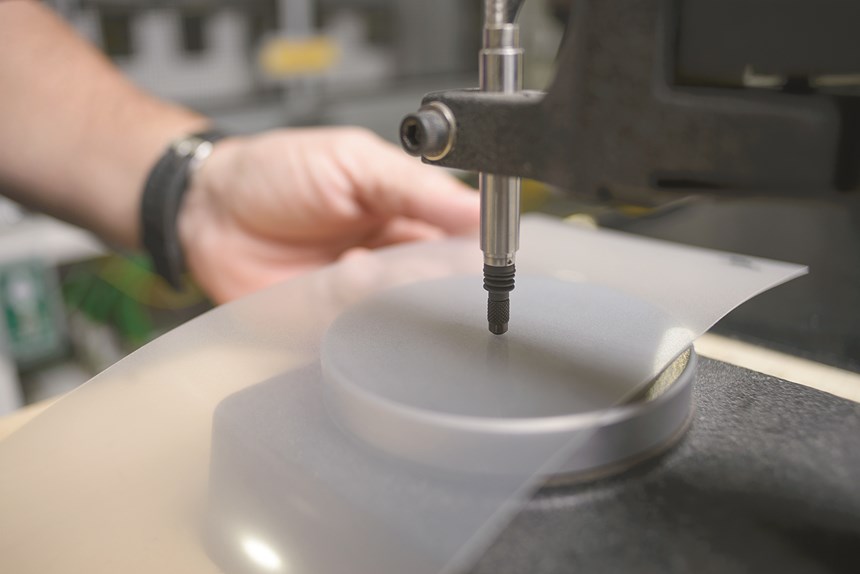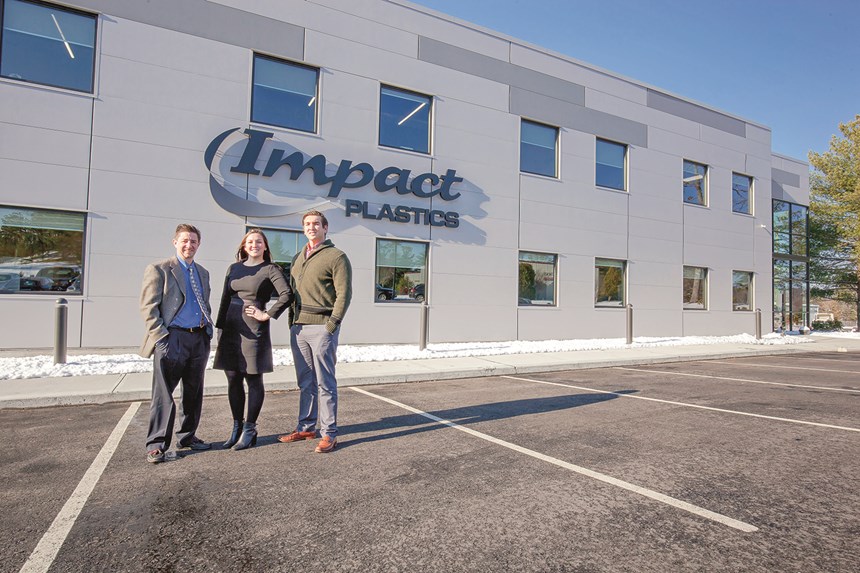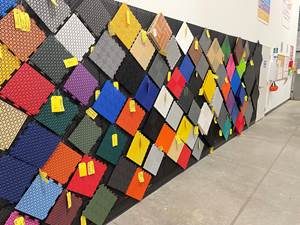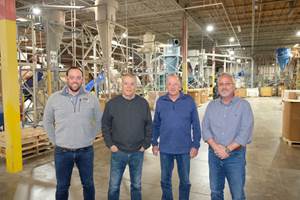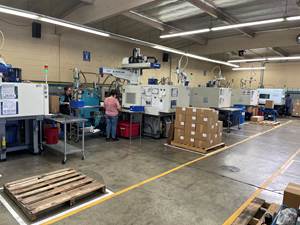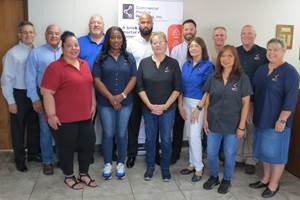For custom extruder Impact Plastics, the gauge is all the rage. It’s been that way since the company was founded in the 1960s. Today, with plants in Putnam, Conn., and Hamlet, N.C., this privately held, family-owned and operated processor specializes in carefully formulated, thin-gauge sheet made from a range of materials serving markets that include food packaging, foodservice, medical, cosmetics, automotive, and custom thermoforming.
That might be how a lot of plastics processors describe themselves. But, perhaps because of the materials background of several of its key executives—both David Kingeter, company president, and Bill J. Burke Jr., general manager, spent years working for a major resin producer—Impact Plastics has a rather unique business model for a mid-sized custom extrusion house. This is not your grandfather’s sheet extrusion company, where, at times, product is run, packaged, and shipped without detailed knowledge of the application. Instead, Impact Plastics seeks to establish a collaborative network that allows it to help develop the application with its customers.
Burke, who operates out of the Hamlet facility, puts it this way: “We are a market-driven company. We listen to what our customers want, and work as a team to solve problems and help our customers achieve their goals.” As a result, rather than attempt to shoe-horn an application based primarily on what it can make, Impact Plastics works up and down the supply chain—teaming with material and equipment suppliers and thermoformers to engineer products that solve problems.
“This requires us to have direct contact with the market, to deal with brand owners not from the top down, but from the bottom up,” states Burke. “Our idea is to create a virtually integrated supply chain that links us in the middle with all of our suppliers upstream and customers downstream. We operate with our customers as though our capabilities are part of their own.
“We collaborate through the entire supply chain,” Burke continues. “We almost always know the end-use application for our product, and by focusing on the end-use application we are able to better understand how to create value for our customers.”
The firm is co-owned by well-known industry veterans Steve Ryan and Kingeter, who serves as president. The company is beginning its transition to second-generation ownership: Kingeter’s daughter Natalie K. MacVarish is the Mid-Atlantic sales representative as well as the company’s marketing director.
Her brother, Blake Kingeter, is the regional sales representative for the Southeast. Chris Ryan is Steve’s son and he handles sales in the Northeast. David Kingeter spends as much time in sales and product development as he does running the operation. Notes Burke, who calls himself a salesman, “Everyone is customer focused, from the president to the sales people, to the operators on the manufacturing floor. Getting to ‘yes’ and meeting our customers needs is the most important thing.”
Putnam serves as the company’s headquarters, where six sheet lines operate in a 110,000-ft2 facility. The plant has a rail siding that accommodates 26 railcars. Coextrusion jobs are run out of Connecticut, where structures of 90/10 to 50/50 in both AB and ABA have satisfied most of the needs of the markets Impact Plastics serves, says MacVarish. That said, the firm is open to new development projects and is positioned to produce either ABC or ABCBA configurations, depending on market demand.
Questions About Sheet Extrusion? Visit the Sheet Extrusion Zone.
The company opened its plant in Hamlet 12 years ago. At 55,000 ft2, it houses three extrusion lines and has a rail siding that can handle up to 26 cars. Between the two plants, Impact Plastics employs about 100 people; approximately 60 are involved in manufacturing.
Each manufacturing facility is equipped to handle both custom and proprietary applications. Company-wide, operators typically focus on specific lines, though they are cross-trained so they can work on any setup. Products currently range from 8 to 250 mils, with the majority of the business focused on 10-90 mil roll stock.
Eight of the nine sheet lines were furnished by Gloucester Engineering (now part of Davis-Standard, LLC, Pawcatuck, Conn.).
NEW PUSH TO PP
The newest line was installed in the fall of 2016. Furnished by Graham Engineering Corporation, York, Pa., this single-layer Welex line is significant for a number of reasons, notably that it aims to support Impact Plastics’ focus on high-value PP sheet. “Our company’s early growth was built on selling PS into various thin-gauge packaging markets, but within the last five years we have directed much of our marketing and development efforts towards polyolefins, with a focus on polypropylene,” states MacVarish. Interestingly, around this same time, Impact Plastics began to ramp up its investments in R&D related to its customers’ application demands.
“We are a market-driven company, not driven by what we can manufacture but what the customer tells us they want.”
Among sheet extruders—particularly those serving packaging—it might be considered unusual not to have APET capacity. But at Impact Plastics, that’s by design. Burke explains the philosophy: “We made a decision about six years ago that we could not create value in the marketplace providing PET sheet.
We asked ourselves, ‘What would we add?’ We answered, ‘Not a lot.’ While we are a custom extruder, we don’t try to be everything to everyone. We made the determination that PET was commoditized, and that a better path for us was to focus on high-value niche applications like thin-gauge PP.”
As Burke explains, PP offers a significant density reduction over PS and PET. In thermoforming, this lower density often translates to a higher yield and a lighter part for the customer. In addition, there’s a gap in the market for high-clarity, microwavable food packaging, and the thermal characteristics and high heat resistance of polypropylene make it an ideal material. Impact Plastics produces a range of PP sheet for packaging, including high-clarity sheet utilizing NX UltraClear PP additive from Milliken Chemical, Spartanburg, S.C., as well as calcium carbonate-filled and talc-filled PP sheet.
“We made the determination that PET was commoditized, and that a better path for us was to focus on high-value niche applications—namely, thin-gauge PP.”
Additionally, the new Welex line, engineered specifically for PP, is being utilized for an undisclosed medical-device application where even the slightest variation in thickness can result in a critical misdiagnosis. The product was developed jointly by the medical OEM and the thermoformer, which, having worked with Impact Plastics on other projects, turned to the sheet processor specifically to develop a 15-mil product where gauge control is critical to the success of the application. The gauge tolerance to meet the requirements of the application is ± 0.33 mil (or 0.00033 in.), with an acceptable gauge range of 0.01470–0.01530 in. With the help of the new Welex line, Impact has been able to successfully hold the gauge tolerance to ± 0.25 mil (or 0.00025 in.) generating a yield of 98%.
“We’ve always prided ourselves in maintaining tight gauge control,” says Burke. “We are always in pursuit of the perfect gauge. But running so thin at high rates is not easy.”
The Welex Evolution line was delivered on Labor Day 2016. Line components include a 130-mm extruder, XSL Navigator integrated controls, Cloeren Incorporated die, specialized hydraulic roll stack with auxiliary cooling rolls and a jumbo winding system. While automatic gauge-control dies are fairly common technology in sheet extrusion, Impact Plastics opted for a manually controlled die, consistent with the tooling on its older sheet lines.
Comments Burke, “We felt that manually controlling the die met our needs better than an auto die. In our experience auto dies tend to trend and wouldn't meet our tight gauge requirements. Instead, we rely on operator vigilance. We develop process parameters every time we set up a line, and we prefer that our operators make adjustments based on the feedback from the gauge-monitoring device. We could never run a line without the dedication and skill of our operators. Our philosophy is that everyone must think of the customer. Everybody must execute to deliver a product that meets or even exceeds their expectations.
“We rely on operator vigilance. We develop process parameters every time we set up a line, and we prefer that our operators make adjustments.”
“We’re agile, and manufacturing is committed to meeting customer needs,” Burke adds. “We’ll interrupt the production schedule, run on a Saturday, or deliver on a Sunday if that is what a customer needs. This past summer, we had a customer that had a very pressing high-volume order with a short lead time that we needed to fill, and our dedicated team rose to the occasion.”
At Impact Plastics, operators also have a vested interest in improving quality. The company has set up a quarterly bonus program that’s tied to customer complaints and product returns. MacVarish notes that Impact Plastics currently has a return rate of 0.5% of total virgin material sales. Its goal is to reduce that to 0.25%.
Impact Plastics did its due diligence before ordering the new Welex line. Burke commented that the project was yet another example of collaboration in Impact Plastics’ “virtual supply chain.”
Wanting to deliver a line that would not only meet the tight tolerances required by the medical project, but would also provide maximum flexibility for future projects, the Welex team led Impact through a detailed specification-gathering process that generated dialogue and enabled data-driven decisions. “The ultimate design was finalized in quote revision H,” Burke recalls. “Welex listened to what we said we needed. But the real reason we’d buy from them again is the way they worked with us every step of the way to make sure the line did what they said it would do. You never really know how good your supplier is until they rise to a challenge. When they pull out all the stops to deliver the required results, that’s a good supplier. We hold ourselves to that standard as well.”
PRODUCT DIVERSITY & SUSTAINABILITY
While Impact Plastics has positioned itself to grow on the polyolefin side of its sheet business, and has a long history in processing PS, it also runs what it calls “Class ‘A’ surface” ABS sheet that is used as a lamination substrate that is insert injection molded for decorative automotive interior components. The firm also has a robust sustainability program, repurposing post-industrial scrap into utility applications as a way to maximize the amount of plastic recycled at both facilities. In addition, Impact Plastics recycles heat generated from the sheet extruders to heat the plant at both manufacturing facilities. The Putnam plant is also in the process of implementing a solar energy system, which will generate some 451,876 kWh of energy in the first year alone.
Related Content
Injection Molder Bases Company Culture on Employee Empowerment
After more than two decades in the industry, Rodney Davenport was given the opportunity to create an injection molding operation in his own vision, and — in keeping with the product he was making — to do so from the ground up.
Read MoreEvolving Opportunities for Ambitious Plastics Recycler
St. Joseph Plastics grew from a simple grinding operation and now pursues growing markets in recycled PP, food-grade recycled materials, and customized post-industrial and post-consumer compounds.
Read MoreBack in the Family Business
In its 45th year, Precision Molded Plastics has carved out a technology and market niche, growing not just when opportunities arise but when they make sense, after its leader changed careers to keep the family business from changing hands.
Read MoreInside the Florida Recycler Taking on NPE’s 100% Scrap Reuse Goal
Hundreds of tons of demonstration products will be created this week. Commercial Plastics Recycling is striving to recycle ALL of it.
Read MoreRead Next
People 4.0 – How to Get Buy-In from Your Staff for Industry 4.0 Systems
Implementing a production monitoring system as the foundation of a ‘smart factory’ is about integrating people with new technology as much as it is about integrating machines and computers. Here are tips from a company that has gone through the process.
Read MoreSee Recyclers Close the Loop on Trade Show Production Scrap at NPE2024
A collaboration between show organizer PLASTICS, recycler CPR and size reduction experts WEIMA and Conair recovered and recycled all production scrap at NPE2024.
Read MoreBeyond Prototypes: 8 Ways the Plastics Industry Is Using 3D Printing
Plastics processors are finding applications for 3D printing around the plant and across the supply chain. Here are 8 examples to look for at NPE2024.
Read More


